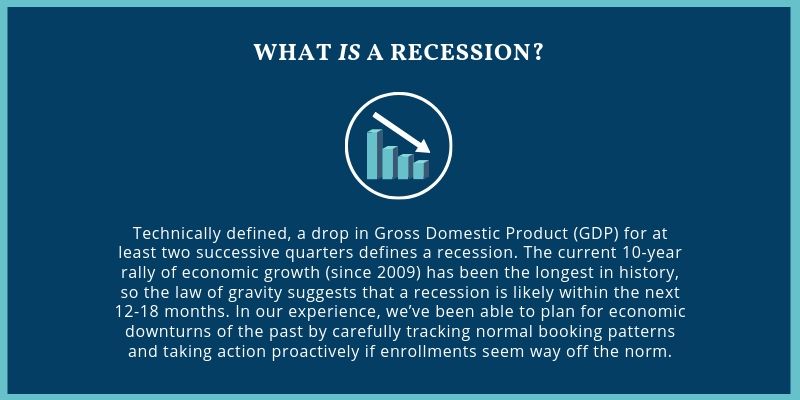A few weeks ago, one of our partners asked us what our “Recession Playbook” looked like. It was the middle of summer: unemployment was at a 50-year low, the Fed just cut interest rates, the Euro was trading favorably, and consumer sentiment was positive. However, news of the U.S’s trade war tactics and political uncertainly heading into an presidential election year gave her pause as she noticed an August slowdown in bookings.
ATA is no stranger to recessions; in our nearly 70-year history, we have weathered many economic downturns and external events. Here are a few of our thoughts on how to prepare.

What indicators does ATA rely on to try to predict a recession and take action?
The most common indicators we look at include:
Unemployment:
Low unemployment signals fewer available workers for each job opening. This creates demand for skilled workers at higher wages. However, unemployment that drops too low poses inflation risks.
Consumer Confidence Index:
This index measures U.S. consumers’ degree of optimism in the economy as expressed in consumer spending.
Housing Starts:
While the rate of home building may not seem related to travel, the construction industry represents nearly 20% of GDP and is seen as a leading indicator of the economy. Why? Home builders will not break ground on new homes if they don’t think the next 12 months will be stable enough to first build, then sell, a new home.
US Citizen Air Traffic Overseas:
A core responsibility of the Office of Travel & Tourism, located within the Department of Commerce, is to collect, analyze, and disseminate international travel and tourism statistics for the United States. Growth in outbound travel often signals business and consumer confidence.
What usually happens to consumer travel behavior in a recession?
For affinity travel brands, booking patterns change, particularly if the stock market is volatile. Travelers often book trips closer to departure when they sense economic uncertainty. They may postpone some travel if multiple trips are planned, but not delay or cancel all travel. In addition, we often see bookings slowdown in a presidential election year.
What steps can travel planners take now?
Communicate your brand’s unique benefits frequently so your customers really know what you stand for. Create urgency to book travel soon with compelling “calls to action.”
Trip leadership is often a brand’s most compelling value proposition. Choose and “cast” your faculty, study leader, or expert carefully. Make sure they value their role of “host” as much as “expert.”
Now more than ever, word of mouth referrals are very important. Ensure each element of your customers’ trip experiences is executed flawlessly, from your courteous first phone call to the inquisitive trip survey you send when they return.
Brands that market aggressively though economic downturns come out ahead in retaining customers.
It is challenging to compete on price in a recession. Instead, focus on making your trips “unshoppable” in the marketplace by reflecting your organization’s unique culture and values.
Make sure you offer a wide variety of destinations and trip types to appeal to many types of travelers.
How has ATA prepared for, and weathered so many recessions?
We conserve in the present, but invest for the future. To maintain or improve its performance, a business must sell more or spend less; it’s that simple. When we don’t see sales growth on the horizon, we get very disciplined and creative in how we cut non-essential spending. However, we never sacrifice our investment in the future, and prioritize new program research and development.
What We Learned From Past Recessions
The Gulf War Era Recession (1990-91)
We learned that timing of bookings matter! Travelers who were already booked on trips when the economy softened tended to stay booked, so cancellations were not rampant. Instead, a lack of new bookings weakened tour enrollments during this period.
Post 9/11 Economic Shock and 2nd Gulf War Recession (2003)
The real effect of September 11th hit the travel industry in 2003 instead of 2002, since many travelers had trips booked in 2002. We learned that relaxing cancellation terms for a period of time to encourage travelers to book travel in an uncertain time was a useful strategy. However, several overleveraged travel companies could not survive the 9/11 shock and the marketplace consolidated into fewer companies.
Housing Crisis and the Great Recession (2008-2009)
The downturn in travel occurred quickly and precipitously. Starting in the fall of 2008, bookings fell approximately 40% in one season. We learned that we needed to act quickly to cut overhead and reduce expenses. Despite a few lean years, it was a time of unusual creativity and experimentation for ATA that set us up for growth when the economy improved. President Obama’s surprise announcement allowing people-to-people travel to Cuba in 2011 was a serendipitous “game changer” that brought full economic recovery to the educational travel community.
We’d love to hear how you’re preparing! Please drop me a note at [email protected].

